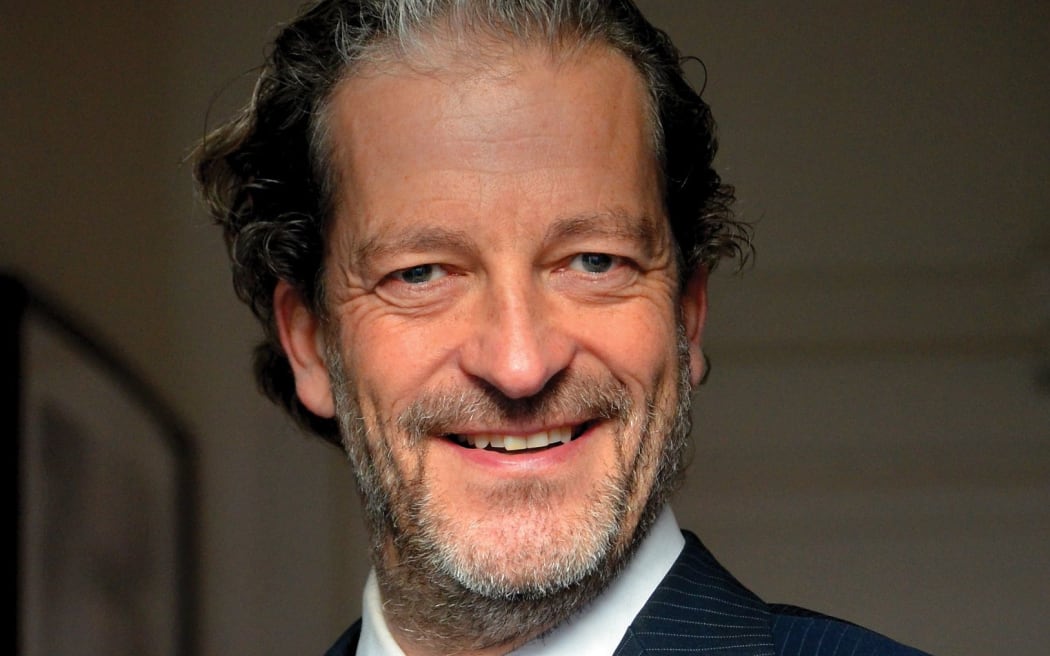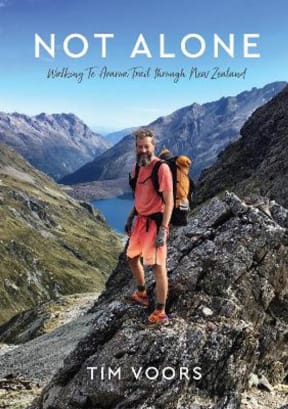
Dutch writer and adventurer Tim Voors Photo: Supplied
The hardships of hiking for months on end aren't for everyone, says Dutch creative Tim Voors, but the exhilaration is like nothing else.
"You feel so alive, and you kind of fall in love with life and the amazing people you meet – it's very exhilarating," he tells Kathryn Ryan.
Voors is a 'thru-walker' who completed Aotearoa's infamous Te Araroa Trail in 2018. He tells the story of his epic five-month adventure in the new memoir Not Alone: Walking the Te Araroa Trail through New Zealand.

Photo: Supplied
Like most thru-hikers (people who walk the length of a country continuously), Voors set off alone on Te Araroa Trail.
This kind of solo adventuring, while "kind of scary", leaves you more open to creating new friendships with characters of all ages from all over the world, he says.
Early on the trail, Voors teamed up with two "really great" and very different women – a "hard rock fan" from Holland and a "very religious organ player from Germany".
"We just had the same walking rhythm and we basically camped together and it was just so wonderful to feel connected. But these two ladies would always get up about six in the morning, and I would wake up at about seven. So every day I would wake up, and they would always be gone."
Hiking in parallel with others, rather than in a group, delivers an "amazing" combination of freedom and togetherness, he says, and is also safer.
Voors' own 'pet fears' – by lightning and trapped by flash flooding – were different from the women's fears of crossing raging rivers.
"Basically, if the fear crippled me, let's say, and I became a bit sort of paralysed up in the high mountains with the lightning, I would walk behind the girls and they would lead the way. And again, when we walked through the dangerous rivers, I would lead the way and they would follow. So I think in dangerous situations, it's good to stick around with people and not sort of brave it out by yourself, because that's when the accidents happen."
Voorst, who is a father of three, has now been doing "silly, long walks" for a decade and tries to make them more of a "structural" than a "sabbatical" part of his life.
He has the support of his wife, who has walked the Camino de Santiago trail on her own, and believes it's important for couples to have solo adventures within a relationship.
"I think it's a matter of just discussing it and talking about it, instead of making this whole plan in your head ... Perhaps start small, perhaps start with a week, or encourage your partner to do the same on their own terms."
While it was "strange" for his teenage kids when he walked America's 4,264km Pacific Crest Trail, Voors says they were okay with it, too.
"Now that they're like, in their 20s, they're beginning to venture out into the world alone also, so has in a certain way inspired or they just see their parents can live together and also can live and do things separately. And that can also be healthy within relationships."
Voors' preparation for Te Araroa Trail was more mental and practical than physical, and he says he began with "just a pretty untrained office body".
The first three or four weeks of any such hike are very tough though, before your body gets used to carrying a heavy pack.
"It's just putting one foot in front of the other and just listening to your body and taking a rest when you're tired."
The mental challenges of walking for months – such as putting on wet clothes in the morning – are not something everyone can handle, he says.
For at least the first month you are "mentally weak", then it becomes exhilarating.
"In my case, it takes me about two months to actually come into a state of harmony with my mind and my body and then I can really fly and enjoy.
"You're walking for 10 hours a day, you get all these hormones, just dopamine, all the, all these cocktail of hormones that just to get activated back, because you're doing sports every day. And that in itself becomes very pleasant and addictive, although the hardships obviously are there, but it's just you kind of feel so alive, and you kind of fall in love with life and the people and the amazing people you meet."
Ydo have to be "some kind of romantic" to be attracted to walking the length of an entire country, he says.
"If you don't have that, it's not just a silly walk – it's a really stupid, pointless walk."
While some people have a clear reason for setting out on such a journey, Voors says in his case it was "a million very small reasons", including a sense of boredom after years of "working hard in big offices with computers".
"I wanted to try something that was very much bigger than me. I think I was hungry for adventure."
Walking the Pacific Crest Trail, he loved meeting "crazy Americans", "safety first Europeans" and all kinds of other folk from around the world.
"You meet all these people on trail and the weather in America is so dry, obviously ... it's a problem because the whole country is on fire. But you can sleep under the stars without having to set up your tent."
If you get the opportunity, walking the Pacific Crest Trail is one of the best experiences you can have, says Voors, whose 2019 memoir The Great Alone chronicles the adventure.
"Anyone who's listening who has an itch in their life, I would say save up for a year and fly to America and walk across it. It's just such an amazing community."
After completing the Pacific Crest Trail, Voors thought he'd just return to corporate life – "Be grateful you know, get back to life as normal". He now sees that spending such a long time in nature changed him fundamentally.
"It's had an effect on everything, you know – how I earn money, how I save money, how I spend time with my children, with my family, how I write. I'm much more a writer instead of a corporate storyteller for other brands. So it's really affected me more than I dared admit at the beginning.
"The biggest risk of venturing out on the adventure is you will in some ways return a little different and I believe closer to the child you once were, as a 12-year-old – happy-go-lucky, skipping through life before all the bills and stuff came."

